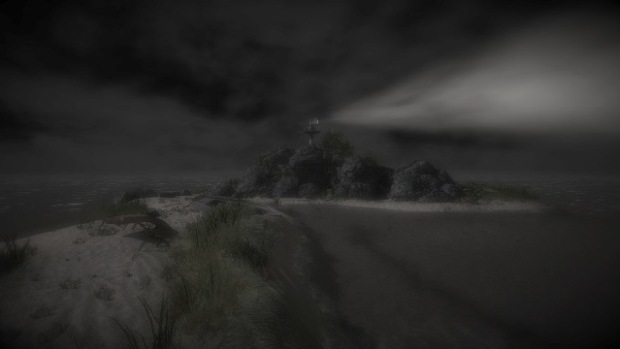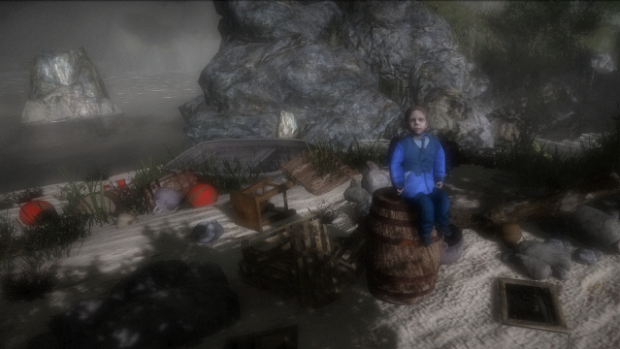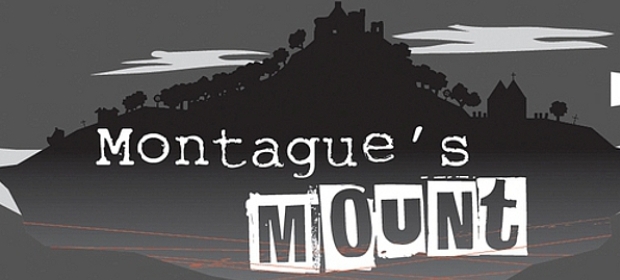In the past few years there have been more and more titles released that push the boundaries of what defines a game. Games like Dear Esther, Gone Home and Journey, to name but a few, rest on the edge of the traditional formats with their sparse gameplay elements and continue to divide gamers on their relevance within the medium. Whether or not the arguments these games incite will ever be resolved (or if they need to be resolved at all), Montague’s Mount is certainly another name to add to that list.
The first of this two-part psychological horror exploration game begins on the beach of an unnamed Irish isle. You awake to stormy rains beating down from the midnight sky with no recollection of who or where you are. A quick search around the tiny cove reveals little, save for a well-needed makeshift crutch, and so you set out across this little spit of land to find some answers. A mysterious, ethereal child haunts your progress across the worn dirt paths and past the decrepit stone houses of the abandoned island. Through old photographs, mementoes and much darker clues, you begin to piece together parts of your identity and the nature of this forsaken place. The narrative is as sparse as the island you explore, but engaging enough to keep you hooked. Though, as with all adventure games, getting stuck on puzzles significantly jars the pacing and slightly upsets the atmosphere the game does so well to cultivate.

One of the unique aspects that will immediately strike you is the bilingual presentation; every item you examine is named “as Gaelige” with an English translation underneath. As an Irishman, it’s odd to see my native language in a game, or indeed anywhere outside of school books and road signs, but the closet patriot inside of me certainly approved. This isn’t the only Irish influence in the game, either: Celtic cross headstones of the seemingly significant Loughlin family dot the game world, as do collectable St. Brigid’s crosses. The landscape of the island is a truly accurate representation of some of more rural areas of Ireland, particularly of places along the west coast, which is by no coincidence as it is these areas that are among the last bastions of the dwindling population of fluent Irish speakers.
The other unique element is a theme of mental health, which actually fits quite well with the Irish setting. Mental health issues have long been the subject of heated debate in Ireland, with rural isolation being one of the main focal points. The game hints at much deeper psychological problems throughout, as the though the amnesia is the least of the protagonist’s worries. Notable quotes from writers and politicians on the topic of mental health punctuate your exploration, foreshadowing disturbing answers to questions you wish you hadn’t asked.

The setting is beautifully accentuated by the weather conditions. Storms come and go at random, bringing torrential rain that obscures your vision and seems to wash the colour right out of the already bleak environment. This adds a very palpable sense of desperation; you may find yourself hopelessly stuck on a puzzle, struggling to keep going, only for the heavens to open and rain liquid despair down upon you. The smothering veil of darkness is pierced very rarely by lampposts and lights that seem to offer hopeful, but unfounded, solace, almost Alan Wake-esque but without the perceivable benefits. A lot of time and effort has gone into giving the island character, a tragic aura that is almost an extension of the protagonist’s anguish and isolation.
The actual gameplay elements are minimal, with puzzles and a rudimentary inventory being your only source of direct interaction. Some of these are quite challenging, but thankfully very logical. It can be difficult to spot key items needed to progress but I found this to be more of a positive than a negative as it promotes deeper exploration of the surroundings. A compass can be brought up on-screen at anytime but, aside from being used in only one puzzle, it’s almost entirely unnecessary. Movement speed is uncomfortably slow, and though it is due to injury sustained during the implied shipwreck, it can be infuriating at times. The game demands a certain amount of backtracking and the snail’s pace at which you travel makes it border on unbearable.

Your character is voiced by Derek Riddell, who puts in an exemplary performance, providing insightful revelations as they develop in your avatar’s mind. Andrea Baroni provides sombre, Silent Hill-style piano melodies with just the right amount of scarcity, leaving the island’s ambient sounds of howling winds and relentless rain to fill in the rest.
VERDICT: Montague’s Mount isn’t perfect. The amnesia trope is getting tired at this stage and it’s a short journey even if it is only the first part. It falls down is in some technical areas too. It’s a little buggy (I got stuck in a wall more than once), and there are some very bad texture-popping issues even with the draw distance maxed out. But these imperfections can be partially forgiven as this is an indie title developed by one man, and they don’t detract from the experience that has been created here. Unique and emotional in so many ways, while tackling issues rarely before seen in videogames, it can be safely said without any hyperbole that this is one of the most important artistic creations ever to come out of Ireland.

VERY GOOD. An 8/10 is only awarded to a game we consider truly worthy of your hard-earned cash. This game is only held back by a smattering of minor or middling issues and comes highly recommended.





